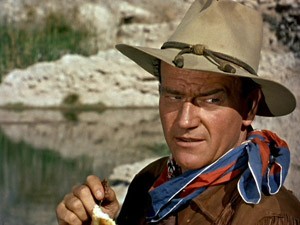
A lot has been written about John Wayne and his early days as an actor in ‘B’ westerns during the 1930s, although even he thought ‘B-Grade’ was rather over-generous description. ‘Hell, they were a lot farther down the alphabet than that’, he recalled. And they were, too. Rock bottom in his career was probably reached when he played ‘Singin’ Sandy Saunders’ in Riders of Destiny (1933), especially considering he did not even do his own singing or guitar playing! By the way, he only played Singin’ Sandy once. According to Duke’s recollection, ‘They went out and brought the best hillbilly recording artist in the country to Hollywood to take my place. For the first couple of pictures they had a hard time selling him, but he finally caught on. His name was Gene Autry.’ Interestingly, back in 1928 John Ford made his last silent western (Hangman’s House), in which Wayne made his first ever screen appearance. Legendary lawman Wyatt Earp visited the set several times (as an uncredited technical adviser), and lunched with the young Duke a couple of times. Earp died a year later aged 80.
.png/230px-John_Wayne_in_Riders_of_Destiny_(1933).png)
as Singin’ Sandy in Riders of Destiny
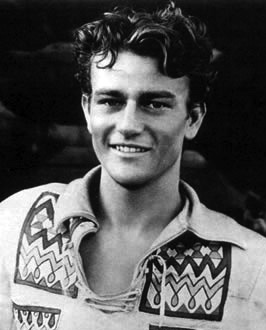
in The Big Trail

with Claire Trevor in Stagecoach
Duke did get one early crack at the big time. In 1930 he was chosen to star in a $2 million production called The Big Trail, but the picture flopped (for technical reasons more than anything else). It was shot in the new 70mm wide screen Fox Grandeur format, but the Great Depression, combined with the cost of converting thousands of cinemas to the new format, sunk the movie and the Duke’s chance at stardom – for the time being anyway. He went back to Poverty Row for almost a decade until John Ford gave him another chance, this time as the Ringo Kid in his 1939 classic Stagecoach. Duke was a hit, began to get A-Grade jobs everywhere. And then along came World War Two.
When the Japanese attacked Pearl Harbor Wayne was 34 years old and in demand by the studios. Some of his supporters argue that he was already too old for the draft, but that simply was not the case. On 19 December 1941, the Selective Training and Service Act (STSA) extended the draft ‘for the duration plus 6 months’ to all men aged 18 to 64. By 5 December 1942, however, the President’s executive order altered the STSA again – to apply to men aged between 18 and 38. The Duke would not be 38 until May 26, 1945. So he was certainly eligible for the draft throughout the war. It has also been argued that a college football injury kept him out of the services because he was unable to run the distance required by military standards. However, there were plenty of spots available in photographic units, propaganda units and entertainment groups, yet Wayne never made it into any of them. Why was that? Did the studio heads use their considerable clout to get him deferred indefinitely? Did he personally manage to stay ‘one step ahead of the draft’, as several of his acquaintances claim they heard him mention on more than one occasion? Or did the government consider him too valuable as a morale-boosting movie star to risk posting him overseas and away from what he did best, which was portraying the all-American hero? Perhaps, after so many years of struggling to reach the top, he was not prepared to toss his new-found stardom away without a fight? It is doubtful if anyone knows the answer, but one thing is abundantly clear. He was of far greater value to the war effort as an actor than he ever would have been in any other capacity.
Decades later he would mercilessly criticize young Americans who dodged the Vietnam War draft, leaving himself open to accusations of hypocrisy, given his own lack of participation in WW2. Since we have no way of knowing the details of his situation, it seems unfair to play the hypocrisy card. After all, the man was no fool. Had he really dodged the draft himself, I doubt very much if he would have opened himself to charges of hypocrisy by accusing Vietnam draft-dodgers of being cowards, communists and traitors to their country. I think it suited everyone – the government, the studio, and Wayne, for him to continue as the All-American hero on the silver screen.

as Big Jim McLain

Robert Mitchum’s son Christopher
It is a great deal more difficult to understand his extreme right wing politics. Not only did he openly support and admire Senator Joseph McCarthy during the Communist witch hunts of the fifties, he even offered his services to help track down any ‘commies’ in the movie industry. He joined Walt Disney, Clark Gable, James Stewart and others in aiding the House Un-American Activities Committee to ferret out suspected communist sympathizers in Hollywood. In 1952 his Big Jim McLain was a love letter to Senator McCarthy and the HUAC, with the Duke hunting down ‘Reds under the bed’ in post-war Hawaii. His budding friendship with Robert Mitchum’s son Christopher ended in 1973 after Wayne and Chris had a disagreement over politics. ‘I didn’t know you was a pinko’, the Duke told him. Not surprisingly, Wayne was a member of the ultra-right John Birch Society, as well as the National Rifle Association (NRA).

blacklisted writer Dalton Trumbo

Jane Fonda in her ‘Hanoi Jane’ days
When asked about the studios’ blacklisting so-called ‘subversives’ in the movie industry, Wayne was 100% behind the FBI and J. Edgar Hoover, a man he greatly admired. ‘If it is for the FBI, I will do anything for them,’ he stated to the press. ‘If they want me to, I will even be photographed with an agent and point out a Communist for them. Tell Mr. Hoover I am on his side. I think those black-listed people should have been sent over to Russia.’ A ‘my country right or wrong’ kind of guy, the Duke despised the Oscar-winning movie All the King’s Men (1950) because, ‘it smears the machinery of government for no purpose of humor or enlightenment’. He publicly criticized Kirk Douglas for employing black-listed Dalton Trumbo (one of the ‘Hollywood Ten’) as screenwriter for Spartacus in 1960. Indeed, on one hand he refuted the democratic right of any American to even sympathize with Communism, yet magnanimously declared to the media (when asked about Jane Fonda’s anti-Vietnam War stance), ‘I’ve never agreed with a word she’s said, but would give my life defending her right to say it.’ Evidently, his defense of democracy was ‘conditional’.
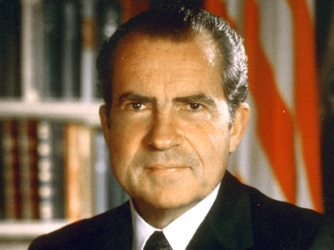
President Richard Nixon
His unabashed admiration for Richard Nixon and his cronies reached a crescendo in 1973. ‘They’re trying to crucify Nixon’, he bleated, ‘but when they’re writing the history of this period, Watergate will be no more than a footnote. Believe me, I have a high respect for the bulldogged way in which our President has been able to continue to administrate this government, in spite of the articulate liberal press – whose only purpose is to sell toilet paper and Toyotas – and in spite of the ambitious politicians who would deny him the help and encouragement that a man needs to face the problems of this country.’ And he was not finished yet. ‘Richard Nixon and I have had a long acquaintance. I respected him as a goodly man – winning or losing over the years. And I think he should be standing in the crowning glory today of his accomplishments.’ (This last comment referred to Wayne’s admiration for Nixon taking the decisions to mine Haiphong Harbor and to bomb Hanoi). ‘Instead, they’ve chosen to blame him for the gradual growth of hypocrisy and individual ambition that have made our political system distasteful to the public.’ It is difficult to think of any endorsement in history that could be as comprehensively amiss than this one. In 1968 he actively campaigned for Nixon.

Sammy Davis Junior and the Duke
Was Wayne a racist? His critics would probably point to comments he made in a Playboy Magazine interview and scream a unanimous ‘yes’. Why? Because he suggested that blacks were not qualified to hold high public office. On the strength of it that sounds rather damning, but he qualified his comment by adding that, ‘discrimination prevented them from receiving the kind of education a political career requires’. One could argue that a confirmed racist would probably not even admit to discrimination of any kind against non-whites, but just when you think you have him pegged, Wayne shoots himself in the foot again. ‘I believe in white supremacy until the blacks are educated to the point of responsibility. I don’t believe in giving authority and positions of leadership and judgment to irresponsible people.’ Oops! That aside, the fact that three of his wives were of Latin descent kind of discredits the whole racist argument anyway. ‘I have never been conscious of going for any particular type’, he told the press. ‘It’s just a happenstance.’ It is a documented fact that African-American actor/singer Sammy Davis Junior was a good friend of Wayne’s. It is also a documented fact, however, that the Duke decided to support Senator Barry Goldwater in his run for the presidency because the senator opposed the Civil Rights Act. As it turned out, Wayne was unable to do so for very long because he was diagnosed with lung cancer and in need of an immediate operation. In that 1964 Presidential election the Duke had briefly campaigned for Goldwater, the candidate whose slogan was, ‘In your heart, you know he’s right.’ Lyndon Johnson’s people responded (in reference to Goldwater’s radicalism) with, ‘In your heart, you know he might’, and ‘in your guts, you know he’s nuts’. This was in direct reference to Goldwater’s advocation of the ‘tactical’ use of nuclear weapons in Vietnam. He was also endorsed by Californian Governor Ronald Reagan, incidentally.
Once asked about the treatment of Native Americans, Wayne replied. ‘I don’t feel we did wrong in taking this great country away from them. There were great numbers of people who needed new land, and the Indians were selfishly trying to keep it for themselves.’ Later, he added, ‘I have no idea what the best method of dealing with the Indians in the 1800s would have been. Our forefathers evidently thought they were doing the right thing.’ Commenting on what the first white settlers in America faced, he said, ‘They found a howling wilderness with summers too hot and winters freezing, and they also found some unpleasant little characters who painted their faces.’
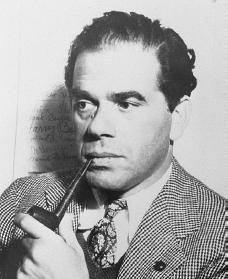
Frank Capra

Coops and Grace Kelly in High Noon
He loathed the Gary Cooper movie High Noon (1952). ‘The last thing in the picture is ol’ Coop putting the United States marshal’s badge under his foot and stepping on it,’ he said. In fact, Cooper does not step on the badge at all, which makes us wonder if the Duke ever watched the thing all the way through. In the same interview he added, ‘I’ll never regret having run (screenwriter Carl Foreman) out of the country.’ And if you think Wayne reserved his loathing for communists or blacklisted writers alone, then his diatribe against director Frank Capra, the man who gave us Mr. Smith Goes To Washington (1939), It Happened One Night (1934) and It’s a Wonderful Life (1946), should intrigue you. ‘I’d like to take that little Dago son of a bitch and tear him into a million pieces and throw him into the ocean and watch him float back to Sicily where he belongs!’ Evidently, Capra walked away from directing Circus World (it was called Circus at the time) because Wayne insisted his favorite screenwriter, James Edward Grant, rewrite Capra’s screenplay. Grant’s simplistic approach, ‘all a Wayne movie needed was some hoyty-toyty dame with big tits that the Duke could end up spanking at the end’, annoyed Capra who had high hopes of making a serious movie, so he took a walk. Ironically, a few years down the track Wayne fired Grant anyway.
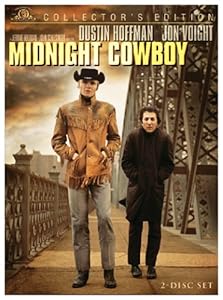
Today, Wayne would surely be classed as a homophobic, despite acting with (and admiring) gay star Rock Hudson. The homosexuality in Tennessee Williams’ Suddenly Last Summer (1959) was ‘too disgusting even for discussion’, Wayne said. ‘It is too distasteful to be put on a screen designed to entertain a family, or any member of a decent family.’ He detested the hint of homosexuality in the Gary Cooper film They Came to Cordura (1959), and described the 1969 films Easy Rider and Midnight Cowboy as ‘perverted’. The latter of the two, he thought, was perverse because it was ‘a story about two fags.’ A staunch Republican for most of his life, Wayne was not above supporting a Democrat on occasion if he believed the issue was a just one. To everyone’s surprise, the man who seemed to think his beloved America could do no wrong, sided with Democrat President Jimmy Carter over the Panama Canal question in 1978. Wayne, like Carter, felt the canal belonged to the Panamanian people, not to the USA.
John Wayne died in 1979, aged 72, and was buried in secret, his grave unmarked until 1999 because his family feared Vietnam War protesters might desecrate the site. ‘Contrary to what people think’, he once said, ‘I’m no politician, and when I have something to say I say it through my movies.’ If only that was true. I truly enjoy many of his movies and his persona in them. If asked to list the ones I enjoy most, I find there are more than I expected, although most of my favorites are westerns. I am less enamored of his gung-ho war films; Sands of Iwo Jima and They Were Expendable being the best of a bad lot. As for his westerns, I love The Searchers, The Man Who Shot Liberty Valence, Red River, She Wore A Yellow Ribbon, Fort Apache, Rio Grande, Rio Bravo, North To Alaska and The Comancheros. Sadly, in my personal opinion, the man could never hope to measure up to the movie star. But then, who could?


Wayne’s westerns were racist, but his extreme right-wing war films were just garbage. The only one that was even remotely watchable was “Flying Leathernecks”, thanks to Robert Ryan providing a few sane points.
I always felt his westerns were condescending more than racist, Mark, but either way they just didn’t quite sit right with me. The war pictures were mostly propaganda films ordered by the government during wartime. Since most of the big male stars were away fighting (or entertaining), he got the lead in many of them. Then, of course, there was the hideous ‘Green Berets’ rubbish…As for Robert Ryan, I totally agree with you. I can scarcely think of a movie he made that was not improved by his presence. A great actor.
I also watched “Mr. Bean.” When I mentioned show to a neighbor, her
response was, “I HATE “Mr.Bean!”
Oddly enough, so do I. Every time I see Rowan Atkinson he seems to do the same old thing – mixing up his words in speeches and stuff. A rubber face is not enough on its own in my opinion. Then again, a zillion people worldwide love him. They can’t all be wrong.
Speaking of political correctness run rampant, I’ve wondered if
“Faulty Towers” were made today, if it could be shown w/out causing
outrage. [This was one of my favorite shows, which I watched each time
it was offered.]
Ah, yes. I love it, too. In fact, my son bought the blue-ray set for me a couple of Xmases ago. I imagine the racism, anti-feminism, and Basil’s generally anti-social views on just about everything would cause an outcry today. It seems the first casualty to nit-picking political correctness is always humour. We can no longer even JOKE about such things without being jumped on. I mean, Chaplin joked about Nazism and Hitler in ‘The Great Dictator’ and got his message across to the world brilliantly. I wonder what the PC zealots would think of that today. Probably bleat about it being ‘anti-German’ or something.
Interestingly, Bacall said, more than once how much she enjoyed
working w/ him in “The Shootist.” Of course, they were miles apart
politically, but they didn’t get into those kinds of discussions.
I doubt very much if many people would have cared for his politics, Sheila, but other than that he seemed to get along with most actors he worked with. He really seemed to be a man who looked at everything in either black or white. No greys at all. He also appeared to have tunnel vision. I will say this for him, however. He never backed down from an issue, nor did he try to avoid confrontation with his opponents. He met them head on every time. One wonders how he would go today, what with political correctness reaching epidemic proportions.